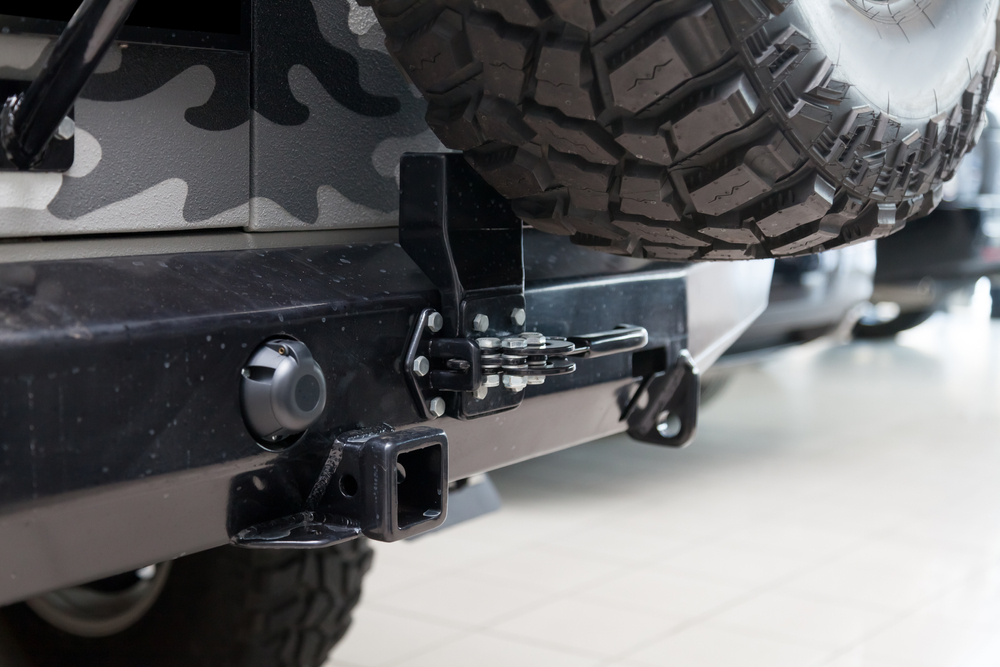If you’ve been wondering lately about how much it costs to install a trailer hitch, you’re not the only one. Whether you’re gearing up for those fun-filled weekend camping trips (don’t forget the marshmallows!), hauling some serious work gear, or planning a big move, having a properly installed trailer hitch can truly make all the difference – for both your wallet, your road tripping, and your peace of mind.
Let’s dive into what really affects the cost of trailer hitch installation, how you can save money, and what to expect when it’s time to get your hands (or your truck) dirty.
The Real Deal | Factors That Affect the Cost to Install a Trailer Hitch
There isn’t a one-size-fits-all number when it comes to the cost of installing a trailer hitch becuase prices can vary depending on a few key factors:
- Vehicle Type – A full-size pickup and a compact SUV won’t use the same hitch. Larger vehicles often require heavier-duty parts and sometimes a more complicated installation.
- Hitch Type – Light-duty receiver hitches are cheaper and simpler than specialized options like gooseneck or 5th wheel hitches.
- Installation Complexity – Some setups are plug-and-play, while others involve trimming, drilling, or removing panels. More labour = higher cost.
- Labour Costs – If you hire a professional (highly recommended for heavier towing setups), expect to pay for both parts and installation service.
On average, most people who are looking for a trailer hitch installation, can expect to spend anywhere from $100 to $600, while more complex hitches – like 5th wheel or gooseneck setups – can reach up to $1,300 or more, depending on the make, model and overall condition of your vehicle and it’s capabilities. .
DIY or Don’t | How To Save Money on Your Trailer Hitch Installation
If you’re someone who is looking to lower your cost to install a trailer hitch, here are some practical and insightful ways to cut the bill without cutting corners:
- Look for Sales & Discounts – Many retailers and auto shops tend to offer promos, especially before spring and summer when towing season starts to ramp up.
- Consider DIY – If you’re confident in your mechanical skills and have access to the right tools, installing a hitch yourself can save you labour costs – however, if you’re not trained in the installation proces, it could lead to some hiccups down the road.
- Get Multiple Quotes – Don’t settle on the first shop. Make sure to compare rates between dealerships, specialty hitch installers like Calgary Hitch Shop, and local garages.
- Ask About Package Deals – Sometimes, depending on the provider, wiring installation, parts, and labour come cheaper as a bundled service.
Saving is smart – but never skimp on safety. Having a poorly installed hitch can lead to damage or accidents that cost far more than a professional installation.
Know Your Hitch | Types of Trailer Hitches & What They’re For
Understanding the different types of hitches helps you make sense of what you’re paying for. Here’s a quick breakdown:
- Receiver Hitches (Class 1–5): The most common, installed under the rear bumper. These range from light-duty (2,000 lbs) to commercial-grade (20,000 lbs).
- Gooseneck Hitches: Installed in the bed of a pickup truck for towing large horse or flatbed trailers.
- Fifth-Wheel Hitches: Also bed-mounted, ideal for large campers and RVs that need more stability.
- Weight Distribution Hitches: Improve handling and balance by spreading weight more evenly across your vehicle.
How much does it cost to install a trailer hitch? Well, varies by type – receiver hitches tend to be the most budget-friendly, while gooseneck and fifth-wheel installations are more labour-intensive and costly.
Step-by-Step | The Trailer Hitch Installation Process
While each setup is unique, here’s what typically happens during a professional installation:
- Quality Vehicle Assessment – Ensuring compatibility and identifying mounting points.
- Part Removal Process – Sometimes, bumpers, spare tires, or panels need to come off temporarily.
- Hitch Alignment – The hitch is positioned and hand-tightened into the right place.
- Securing & Torquing – Bolts are tightened to exact manufacturer specs.
- Wiring Installation (if necessary) – For trailers with lights or brakes, wiring harnesses are added.
- Final Inspection – Every connection and torque point is checked for safety.
- DIY installs follow similar steps – just with a little more elbow grease and a lot more patience.
Common Slip-Ups | Trailer Hitch Mistakes to Avoid
Trying to save on the Cost to Install a Trailer Hitch can really backfire if you rush or skip some critical steps. Watch out for these common mistakes:
- Choosing the wrong hitch type or weight class for your vehicle.
- Forgetting to torque bolts properly.
- Skipping wiring connections (or doing them incorrectly).
- Neglecting to double-check your towing capacity.
When in doubt, call a local expert –like our skilled team at The Calgary Hitch Shop – to double-check your setup before hitting the road.
Bottom Line | How Much Should You Expect to Pay?
So, what’s the real cost to install a trailer hitch?
Depending on your hitch type, vehicle, and whether you go DIY or professional, expect anywhere between $100 and $1,300 (we know, it’s quite a range).
A smaller SUV might only need a simple receiver hitch install, while a heavy-duty truck pulling a camper could require a more specialized system.
Either way, the investment is worth it for safer towing, smoother handling, and way fewer headaches on the highway.
Ready to Roll? | Choose Calgary Hitch Shop
If you’re looking for the most effective way to install a trailer hitch without compromising safety or performance, reach out to The Calgary Hitch Shop.
Our experts at Calgary Hitch Shop can help you choose, install, and maintain the right hitch for your vehicle – so you can tow like a boss – no matter where the road takes you.


